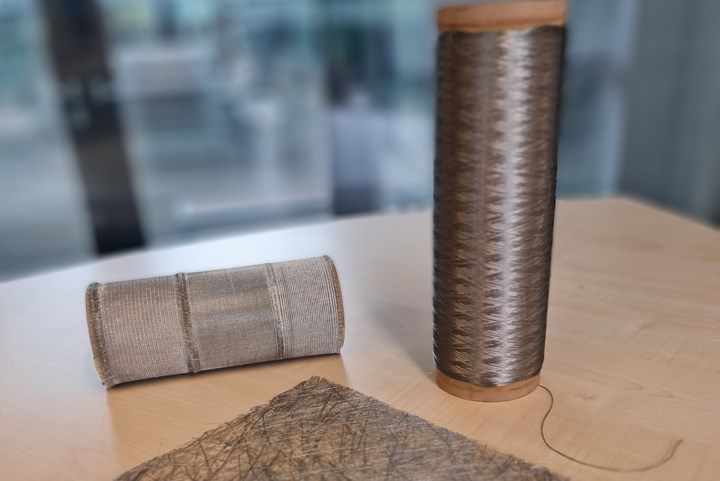Aluminum-coated, multifilament yarn shields against electromagnetic radiation
FibreCoat and DBF Deutsche Basalt collaboration develops a material combining a basalt fiber core coated with aluminum that is light, strong, cheap and sustainable.

Photo Credit: ITA Institut für Textiltechnik of RWTH Aachen University
(Aachen, Germany), a spin-off of the Institut für Textiltechnik (ITA) of RWTH Aachen University, together with (Sangerhausen, Germany), reports that it developed a new, sustainable type of fiber reinforcement which combines basalt and aluminum materials to shield electromagnetic radiation (ER) from digital end devices, medical technology or e-car batteries effectively and at low cost.
Instead of preventing ER interference via metal fiber fabrics — which the companies note is a time- and energy-consuming procedure — the new material uses a fiber core made of melted, thinly drawn basalt, which is coated with aluminum and bundled into AluCoat yarn. This yarn reportedly remains just as conductive and provides the same amount of shielding, but is lighter, stronger, cheaper and more sustainable than previous alternatives. For example, 1,500 meters of yarn are said to be produced per minute versus the previous five meters. Further, energy required to produce the material is only 10% of the previous amount, the number of process steps have been reduced from 10 to one and the resulting price is reportedly 20 times lower.
The textile is also versatile and flexible. As wallpaper it can shield 5G radiation in offices or medical rooms or encase batteries and thus ensure the smooth functioning of electric cars, FibreCoat and DBF Deutsche Basalt say. AluCoat is already being used in some companies, and a European fiber center in Sangerhausen is being planned for mass production.
The joint project was also awarded the overall prize at the 17th IQ Innovationspreises Mitteldeutschland online event on June 24, which was broadcasted live from Leipzig, Germany.
Related Content
-
Bio-based SiC ceramics from wood polymer composites
Austrian research institute Wood K plus makes 95% silicon carbide ceramics more sustainable (>85% bio/recycled content), enables 3D shapes via extrusion, injection molding and 3D printing.
-
JEC World 2025 highlights: Evolving recycling and biomaterials technologies
CW technical editor Hannah Mason shares sustainability-focused composites trade show highlights featuring maturation, scale-up, new partnerships, and new technologies in biomaterials and recycling.
-
Melker of Sweden accomplishes sea kayak with 100% sustainable composite construction
Built with ampliTex flax fabrics, a solid cork core and Sicomin plant-based resins, the company’s Värmdö kayak model highlights an environmentally conscious design for paddlers of all levels.






